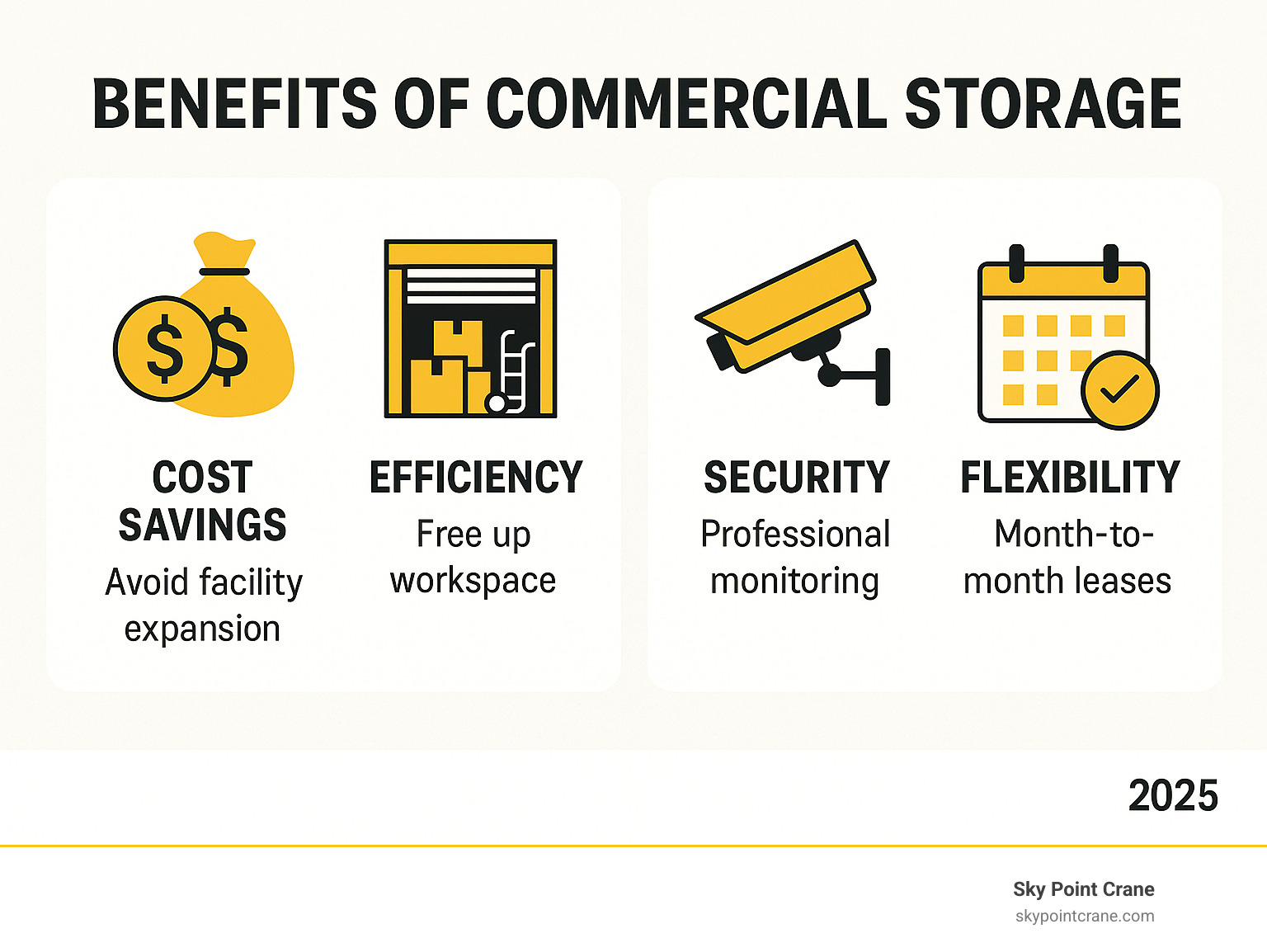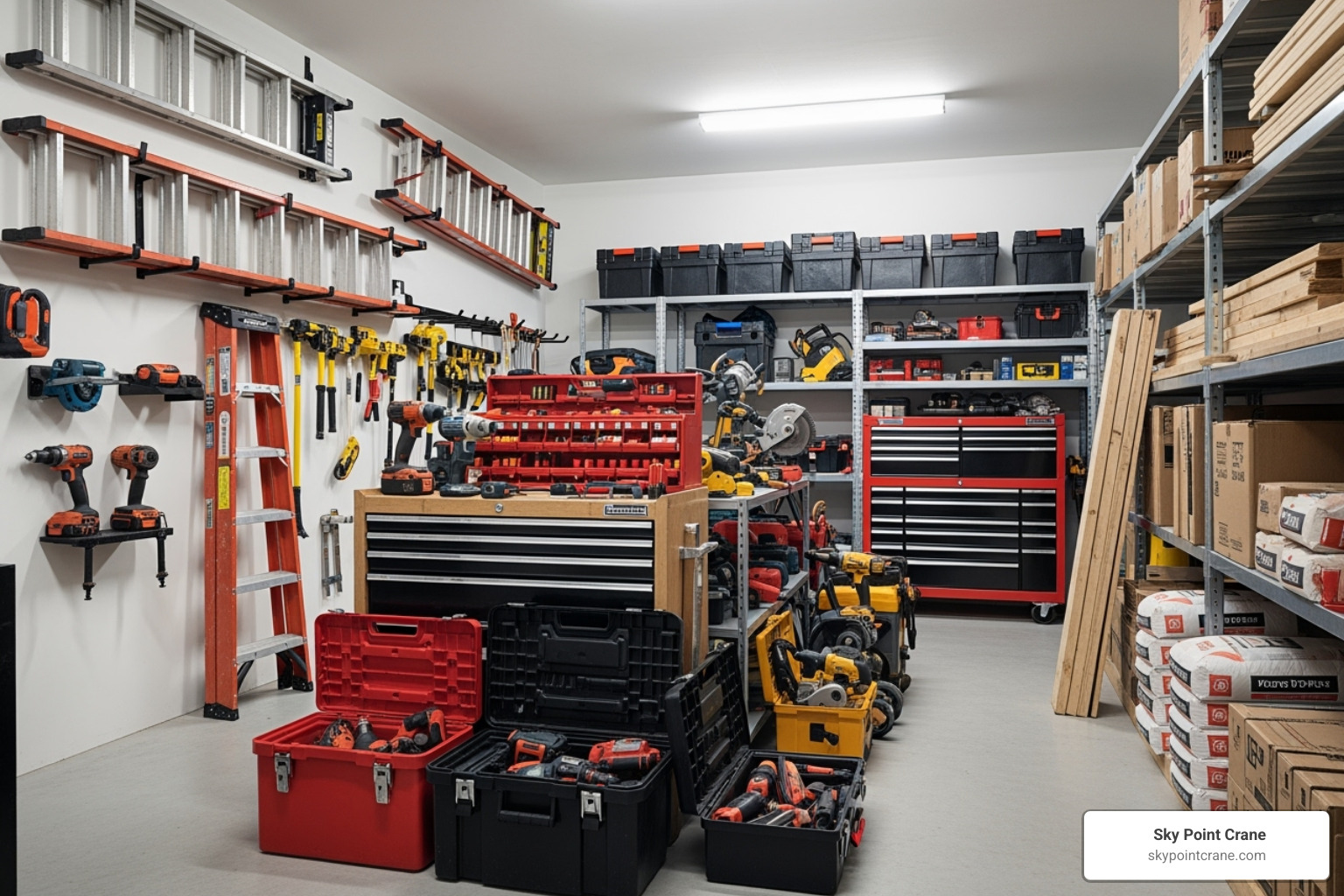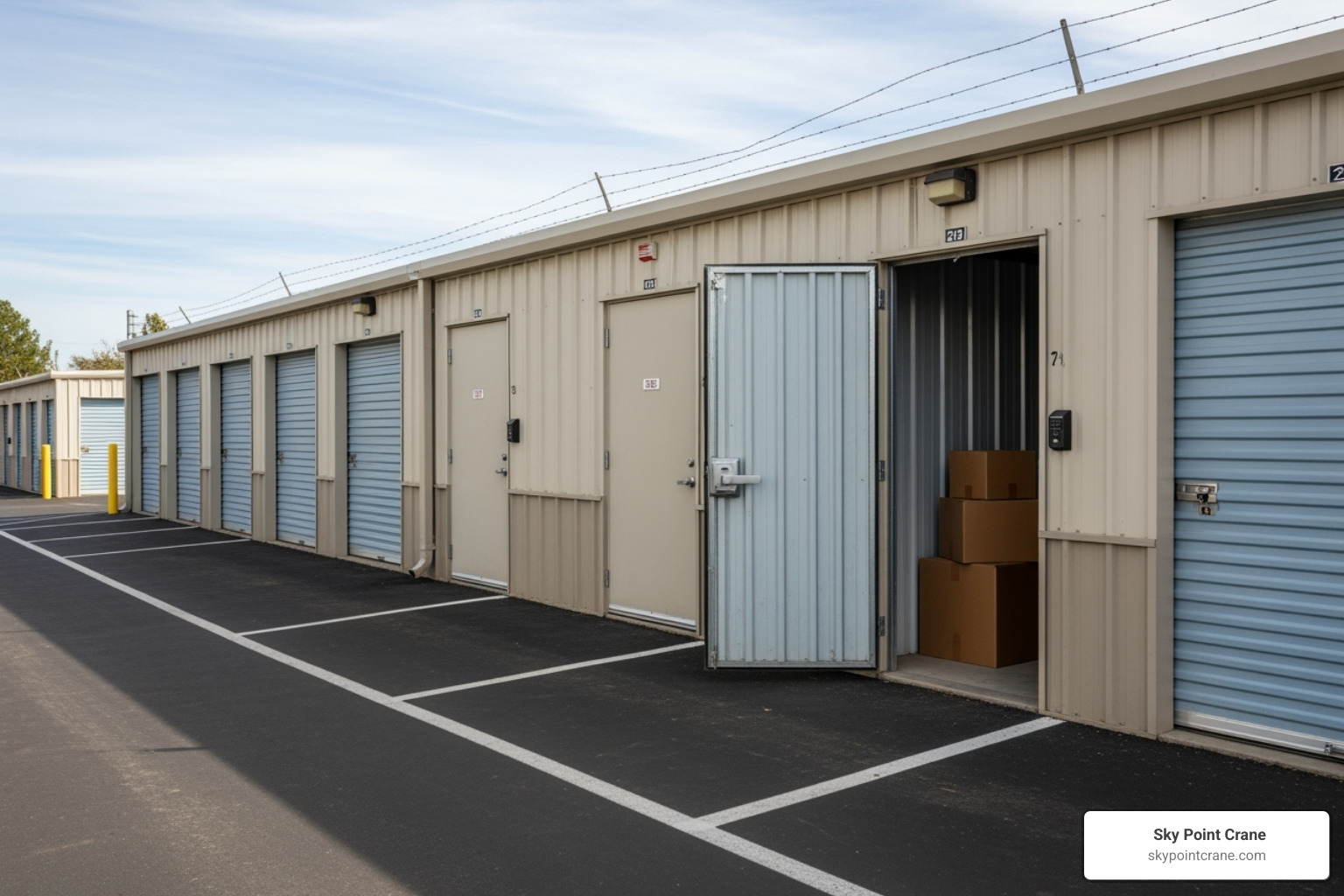Why Commercial Storage Space Is Critical for Modern Businesses
Commercial storage space provides businesses with secure, off-site locations to store inventory, equipment, documents, and other essential items without the high costs of expanding their primary facilities. With the self-storage industry valued at $38 billion and projected to reach $54.6 billion by 2027, businesses account for approximately 15% of all storage rentals, a clear sign of growing commercial demand.
Key Benefits of Commercial Storage:
- Cost Savings – Avoid expensive office or warehouse expansions
- Operational Efficiency – Free up valuable workspace for revenue-generating activities
- Flexibility – Month-to-month leases adapt to changing business needs
- Security – Professional facilities with 24/7 surveillance and climate control
- Accessibility – Extended access hours and drive-up convenience
Whether you’re a contractor needing tool storage, a retailer managing seasonal inventory, or a firm archiving documents, commercial storage offers scalable solutions. The average unit costs around $130 per month—often far less than additional office or warehouse space.
I’m Dave Brocious, and with over 30 years of experience in the energy and industrial sectors, I’ve seen how strategic commercial storage space decisions improve operational efficiency and reduce overhead. My work with Sky Point Crane confirms that proper storage and logistics planning directly impacts project success and bottom-line results.

Explore more about commercial storage space:
What is Commercial Storage and Why is it Essential for Business Growth?
Commercial storage space is a secure, professional facility where you can store inventory, equipment, and documents. It gives your business room to grow without the high cost of expanding your current location. By moving items not needed daily—like seasonal inventory, excess files, or seldom-used equipment—to a storage unit, you free up valuable workspace.
This matters for growth because every square foot of your primary location should be productive. A cluttered workspace or showroom hinders operations and deters customers.
Overflow inventory management is simplified with commercial storage. You can keep excess inventory safely stored off-site instead of cluttering your primary location. This is ideal for businesses with seasonal fluctuations, allowing them to store holiday decorations, summer equipment, or winter gear when not in use.
Equipment protection is another key benefit. Expensive tools and machinery are significant investments. Storing them in a secure, climate-controlled unit protects them from damage and theft, keeping them in top condition and ready for use.
Document archiving is crucial for many businesses. Legal, financial, and client records can overwhelm an office, and many industries require long-term physical record retention. A storage unit keeps these documents organized, secure, and accessible without cluttering your workspace.
The cost-effectiveness is a major advantage. Expanding or moving to a larger space involves significant costs and long-term commitments. In contrast, a commercial storage unit averages around $130 per month, a fraction of the cost of additional commercial real estate.
This approach improves operational efficiency. An organized, clutter-free workspace allows your team to focus on core tasks instead of searching for items. This leads to better productivity and an improved customer experience.
For businesses looking for custom solutions, Commercial Storage Solutions can provide the specialized approach your operation needs.
Who Benefits Most from Commercial Storage?
Commercial storage space is versatile, benefiting businesses of all sizes and industries. The most common users include:
Retail and e-commerce businesses use storage for seasonal inventory, promotional displays, and new product launches. E-commerce businesses can create mini-warehouses for inventory and shipping supplies, freeing up home or office space and professionalizing their operation.
Contractors and tradespeople like electricians, plumbers, and builders use storage as an organized home base for tools and materials. A unit keeps expensive equipment secure and accessible for the next job, eliminating clutter in vehicles and garages.
Pharmaceutical representatives deal with unique challenges, carrying samples and marketing materials that often require specific storage conditions. Climate-controlled units keep these items organized and protected between client visits.
Professional services such as law firms, accounting offices, and medical practices use storage for document archiving. Physical records often require retention for compliance, and a secure, climate-controlled unit keeps sensitive files safe without cluttering the office.
Industrial and manufacturing businesses use commercial storage as extensions of their facilities for overflow inventory, specialized parts, or equipment that doesn’t fit in their primary location.

How Storage Solves Inventory, Equipment, and Document Challenges
Commercial storage space solves several common business challenges.
Seasonal inventory management is a major benefit. Items like holiday decorations or seasonal clothing don’t need to occupy prime real estate year-round. Storage allows you to scale space based on demand, saving money and keeping your primary location relevant.
Secure tool and machinery storage is vital for trades and industrial businesses. Tools are valuable investments and theft targets. Professional storage facilities offer security features like surveillance and gated access. For heavy equipment, Industrial Storage provides robust solutions.
Drive-up access makes loading and unloading bulky items convenient, saving you from carrying heavy equipment through narrow hallways or up stairs.
Record-keeping and compliance becomes manageable with dedicated storage space. Industries like healthcare, finance, and legal face strict regulations about document retention. A climate-controlled unit protects these documents from moisture, temperature fluctuations, and unauthorized access.
Archiving important files goes beyond compliance. Blueprints, intellectual property, and historical records need protection from environmental damage and loss. Commercial storage provides that security without turning your office into a document warehouse.
Reducing on-site clutter has a profound impact on productivity, morale, and customer perception. Moving non-essential items like excess inventory, old furniture, or archived documents to commercial storage space creates a clean, professional, and efficient environment. This results in better workflow and a more positive impression on clients.
A Guide to Finding the Perfect Commercial Storage Space
Finding the right commercial storage space requires finding a reliable and convenient partner for your business operations. Key considerations include:
Location convenience is a top priority. A unit should be close to your primary business, job sites, or distribution routes. Easy access saves time and transportation costs, allowing for quick item retrieval.
Facility reputation is crucial. Check reviews for feedback on security, cleanliness, and customer service. A reliable provider will be transparent and have responsive management, as you are trusting them with valuable business assets.
Sizing needs require careful assessment to determine the most cost-effective unit size. Evaluate what you need to store, from documents to large equipment. Overestimating means paying for unused space, while underestimating can lead to logistical problems later.
For a comprehensive overview of available facilities in your area, check out Commercial Storage Facilities.

Essential Features to Look for in a Commercial Storage Provider
When evaluating commercial storage space providers, look for these essential features to protect your business assets.
Security systems are a must. Look for robust protection like 24/7 video surveillance, electronic gate access, good lighting, and individual unit alarms. Perimeter fencing and restricted floor access are also valuable features for protecting your assets.
Climate and humidity control is critical for sensitive items like electronics, documents, wood, metal, and medical supplies. Climate-controlled units maintain steady temperatures (typically 55-80°F) to prevent damage like warping, mold, and rust.
Access hours are important, as business doesn’t always happen 9-to-5. Facilities with extended hours or 24/7 access offer the flexibility needed by contractors with early starts or e-commerce businesses fulfilling late orders.
Delivery acceptance services can be a game-changer for businesses receiving frequent shipments. Some facilities will securely receive packages and place them in your unit, saving you trips and ensuring deliveries aren’t left unattended.
Drive-up access is invaluable for loading and unloading heavy or bulky items. Ground-level units let you drive right up to the door, which is ideal for contractors and retailers managing large inventory. For items needing outdoor accessibility, consider Outdoor Industrial Storage.
Online account management streamlines administration. Quality providers offer centralized billing, easy payments, and user controls, eliminating paperwork and helping you monitor usage efficiently.
How to Choose the Right Size and Type of Commercial Storage Space
Choosing the right unit size is crucial for optimizing costs and efficiency. Avoid paying for unused space or cramming assets into a unit that’s too small.
Storage unit sizes follow standard dimensions. A 5×5 unit (25 sq ft) is like a small walk-in closet, perfect for documents or small inventory. A 5×10 unit (50 sq ft) suits a small office’s contents or e-commerce inventory. The popular 10×10 unit (100 sq ft) handles excess retail inventory well. 10×15 units (150 sq ft) work for seasonal equipment, while the 10×20 unit (200 sq ft) is like a one-car garage, great for equipment or bulk inventory. For larger needs, 10×30 units (300 sq ft) function as small warehouse spaces.
Assessing your inventory volume is key before signing a lease. Take a detailed inventory, measure bulky items, and estimate box quantities. Many facilities offer online calculators or staff assistance to help you choose the right size.
Here’s a practical comparison of what different unit sizes typically hold:
| Unit Size | Approximate Contents | Ideal Business Use |
|---|---|---|
| 5×5 | 100 boxes/bins | Documents, small inventory, office supplies |
| 5×10 | Small office contents | Growing e-commerce, records, small equipment |
| 10×10 | 1-2 room apartment worth | Retail inventory, promotional materials, office furniture |
| 10×15 | 2-3 bedroom house contents | Larger inventory, construction tools, trade show displays |
| 10×20 | 3-4 bedroom house, small vehicle | Equipment storage, vehicle storage, bulk inventory |
| 10×30 | 4-5 bedroom house, large vehicle | Large inventory, multiple machines, extensive archives |
Vehicle and trailer storage deserves special consideration. Look for facilities with specialized options, like enclosed units for cars or outdoor parking for trailers, which is useful for contractors.
For sensitive equipment or long-term machinery storage, Indoor Industrial Storage provides maximum protection from weather and improved security features.
Specialized storage needs might require conditions beyond standard climate control. Always clarify usage restrictions and available accommodations before committing to any commercial storage space solution.
Understanding the Costs and Legalities of Business Storage
Understanding the costs and legal aspects of commercial storage space can save you from future surprises and is an investment in your business’s peace of mind.
Commercial storage is generally affordable, with the average U.S. rental rate around $130 per month for a standard unit. However, like all real estate, location significantly influences price.
Several key factors influence pricing. Location is the biggest driver; a unit in downtown Pittsburgh will cost more than one in a rural area. Unit size also plays a role, and sometimes a larger unit offers better value per square foot. Special features like climate control or drive-up access typically add $20-50 to your monthly bill. Market demand also affects pricing, as facilities with high occupancy rates tend to charge more.
Flexible lease terms are a major benefit. Most storage facilities offer month-to-month agreements, unlike traditional commercial leases that lock you into multi-year commitments. This flexibility is invaluable when your business needs change quickly.
For businesses exploring rental options, Business Storage for Rent provides comprehensive solutions custom to commercial needs.

Decoding Commercial Storage Rental Prices and Leases
Knowing what to look for in a rental agreement can save you money and headaches.
Month-to-month leases are standard for business storage, offering valuable flexibility. Unlike traditional commercial leases, they allow you to adapt to changing project timelines or inventory needs without being locked into a long-term commitment.
That said, long-term commitments sometimes pay off. If you need storage for a year or more, ask about annual prepayment discounts. Some facilities offer 10-15% savings for longer commitments.
Watch out for hidden fees like one-time administrative fees ($10-25), late payment charges, and mandatory insurance. A reputable facility will be upfront about these costs.
Insurance is a big deal. Most facilities are not liable for your stored items. Your business property insurance might cover off-site storage, but you must verify this with your agent. If not, facility-offered insurance typically runs $10-30 monthly and is a worthwhile investment.
Finding affordable options takes some homework. Compare nearby facilities, look for move-in promotions, and consider locations slightly off the beaten path for better rates. Most importantly, size your unit accurately to avoid paying for unused space.
For larger space requirements, Commercial Storage Buildings for Rent offers warehouse-style solutions that might provide better value.
Important Legal and Regulatory Considerations for Commercial Storage Space
The legal side of commercial storage space is straightforward, but a few key points require attention to avoid future complications.
Using storage as your business address is typically not allowed for official registration or mailing. While facilities may accept package deliveries to your unit, you still need a separate, legitimate business address for legal and tax purposes.
Prohibited items rules exist for safety and legal protection. Banned items usually include hazardous materials (chemicals, flammables), perishables, living things, and anything illegal. If storing industrial supplies, clarify what’s acceptable beforehand.
Liability and insurance responsibilities rest with you. Storage facilities provide security, but they are not automatically responsible for damaged or stolen items. Proper business insurance for off-site storage is essential.
Zoning restrictions rarely affect standard unit rentals but can be relevant for larger industrial spaces or specific operations. Check with facility management and your local zoning office if you have specific needs.
The bottom line is that commercial storage space offers tremendous flexibility and value when you understand the costs and legal framework.
Frequently Asked Questions about Commercial Storage
Running a business means dealing with storage challenges, and we get plenty of questions about commercial storage space. Let me share the answers to the most common ones we hear.
Can I operate my business out of a storage unit?
The short answer is no. Commercial storage space is for storing inventory, equipment, and documents, not for running business operations. You cannot use a unit as an office, retail shop, or workshop. Restrictions on activities like working on vehicles or operating machinery exist for safety, insurance, and zoning reasons. Think of a unit purely as storage; the actual work must happen elsewhere.
What is the difference between self-storage and a dedicated warehouse?
The differences are significant. Commercial storage space (self-storage) involves renting individual, secured units of various sizes within a larger facility, typically on a flexible month-to-month basis. It’s an affordable solution for small to medium businesses needing overflow space, often with amenities like climate control and package acceptance.
A dedicated warehouse is a large industrial building leased for multiple years. It includes features like loading docks and high ceilings for heavy equipment and is suited for large companies with complex logistics. Warehouses represent a much larger financial commitment. For most businesses, commercial storage offers a better balance of function and flexibility.
Are my items automatically insured by the storage facility?
No, your items are not automatically insured by the storage facility. While facilities provide security, they are typically not liable for loss or damage to your property from events like fire, theft, or natural disasters. The responsibility for insurance falls on you.
You have two main options: first, check if your existing business property insurance covers off-site storage. Second, purchase a separate storage insurance policy, which may be offered or required by the facility.
Always verify your coverage, as replacing business assets can be expensive. Proper insurance is essential to protect your investment.
Conclusion
Commercial storage space is more than just a place for extra items; it’s a strategic business decision that frees up resources to grow your company. Cluttered office space, wasted time searching for items, and unprotected equipment all carry costs. Commercial storage solves these problems by providing secure, flexible space without the commitment of leasing or buying more property.
For contractors, retailers, or service businesses, the right storage solution can transform operations. The benefits include flexible month-to-month leases, professional security, and protective climate control, all at a fraction of the cost of additional commercial real estate.
At Sky Point Crane, we know that proper infrastructure is key to operational success. A smart storage strategy positions your business to run more smoothly by keeping valuable assets organized, secure, and accessible. When your valuable assets are properly stored and easily accessible, everything else runs smoother.
The self-storage industry’s growth shows that smart business owners recognize commercial storage space as an investment in efficiency, security, and scalability.
Ready to see how industrial storage can support your heavy equipment and materials? Find the right industrial storage solution for your heavy equipment and materials and find what organized, professional storage can do for your business.
